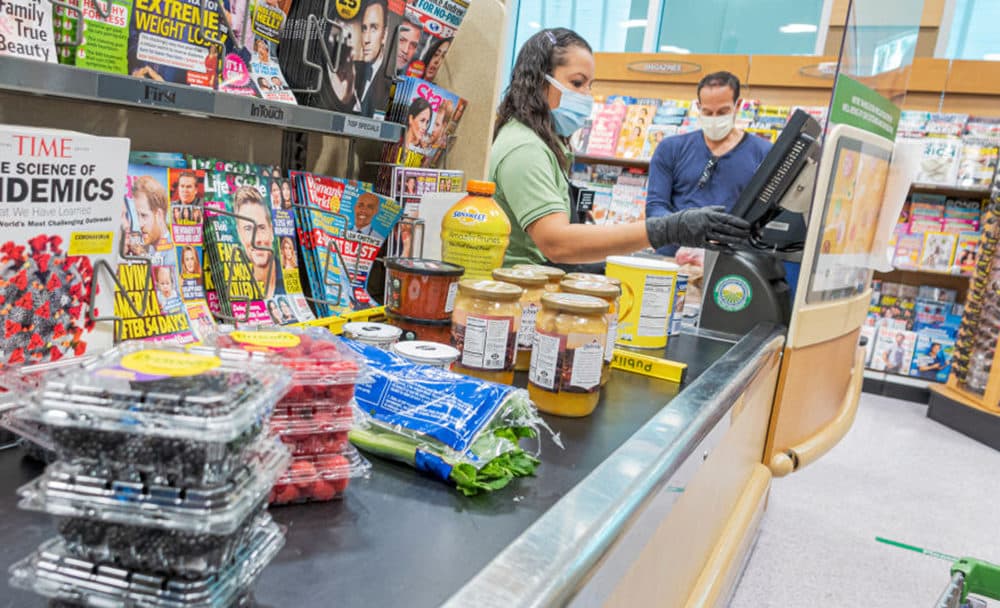Advertisement
Once Heroes, ‘Now Zeros’: Frontline Workers Fall Behind On COVID-19 Vaccine Priority List
Resume
Frontline workers, whether they are making a living at grocery stores, meat-packing plants or driving buses, are still waiting their turn to get vaccinated against the coronavirus.
A number of states across the country have begun offering vaccinations to anyone over 65 years old because older people are at higher risk. But many frontline workers are Black and Hispanic, and living in communities that have been hit hard by the pandemic.
Some of them are pointing out that they should be getting the shots now.
Sam Dancy, who is a front end supervisor at the Westwood Village QFC in Seattle, a grocery store owned by Kroger, says he doesn’t feel 100% safe going to work. Customers don’t always follow the store’s mask policy and aren’t always mindful of guidance to stay 6-feet apart from others.
If he and his coworkers were able to get the vaccine, Dancy says they “might feel a little bit safer” and less concerned about contracting the coronavirus at work.
“I had associated this with going to war because COVID-19 is like fighting the war,” he says. “And until they give us all the proper weapons that we need to be able to fight this battle, none of us are going to feel as safe as we have been.”
Working in the grocery store during the pandemic has not only taken a physical toll on workers, but it’s also been mentally detrimental, Dancy says, because “when people sneeze or people have a cough, that's the first thing from a mental standpoint that we think, 'Do we have COVID?' ”
Dr. Richard Besser, president of the Robert Wood Johnson Foundation and former acting commissioner of the Centers for Disease Control and Prevention, is calling for more states to get shots into the arms of frontline workers. He says the coronavirus is having a “disparate impact” on people of color because a disproportionate number of them are in frontline jobs that put them at increased risk.
“I think that it's critically important that we recognize that while every community is being hit hard by this pandemic, the burden of this disease is not being felt equally,” he says. “And those people who need to leave their homes every day to earn money, to pay the rent, to make sure that everyone else has food on their table, we need to do all we can to protect them.”
Part of the problem is that states are focusing on increasing the overall number of people they vaccinate each day, Besser says. That means people who are harder to reach — whether it be because they don’t have access to the internet or can’t leave work to go get vaccinated — are being left behind.
“It's a failure to put in the resources to build the systems to meet people where they are,” he says, “and that is a reflection of decades of underinvestment in our public health system, and it's a reflection on who in America we value and who we do not.”
Health officials also need to be more transparent who qualifies in the first phases of vaccination and who doesn’t, Besser says. For example, Besser says he isn’t seeing patients right now, so he chose not to get the vaccine with the first round of health care workers who got shots.
Within six months, Besser hopes vaccines will be available to anyone who wants one. But right now officials need to focus on improving the system so that it serves those who need vaccines the most.
“In the interim, we need a system that is fair and just,” he says. “What we're seeing is a system that is anything but that, where the disparity by race in terms of vaccination is growing and growing and there's a false narrative that it's because people of color don't want the vaccine.”
Back in Seattle, Dancy says he has no idea when he can get the vaccine because the rollout in Washington state, like many states across the country, has been slower than expected. He’s hoping he can get it soon.
“We're on the front lines,” he says. “At one time we were considered heroes. I guess we're now zeros.”
Jill Ryan produced and edited this interview for broadcast with Tinku Ray. Samantha Raphelson adapted it for the web.
This segment aired on February 5, 2021.

